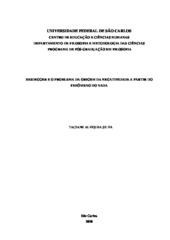| dc.contributor.author | Silva, Taciane Alves da | |
| dc.date.accessioned | 2020-04-29T13:28:44Z | |
| dc.date.available | 2020-04-29T13:28:44Z | |
| dc.date.issued | 2020-03-12 | |
| dc.identifier.citation | SILVA, Taciane Alves da. Heidegger e o problema da origem da negatividade a partir do fenômeno do nada. 2020. Tese (Doutorado em Filosofia) – Universidade Federal de São Carlos, São Carlos, 2020. Disponível em: https://repositorio.ufscar.br/handle/ufscar/12670. | * |
| dc.identifier.uri | https://repositorio.ufscar.br/handle/ufscar/12670 | |
| dc.description.abstract | Nowhere else in the itinerary of Being and Time (1927) does Heidegger explicitly problematize the status of the nothing inherent in the structure of being of human existence when, from the notion of nullity, he recognizes in § 58 the unfounded (finite) character of Dasein. Regarding the clarification of nothingness, negativity (Nichtheit), latent in the existential structure of nullity, as an index of finitude, the ultimate meaning and significance of both are left, in Being and Time, as a task to be accomplished. Based on this diagnosis, this thesis proposes to investigate the ontological-metaphysical meaning of the phenomenon of nothingness, starting from the hypothesis that the problem can be taken as a guiding thread to understand a significant part of Heidegger's investigative path, mainly the path that extends from 1912 to 1939. It is intended to maintain that such a conducting thread has a fundamental and systematic character, insofar as, to be elucidated, it demands the determination of the status of the relationship between ontology, metaphysics and logic in the Heideggerian thought itinerary. Thus, far from being, at first sight, a circumstantial concern regarding the leitmotiv of Heidegger's thought, Seinsfrage, the question of nothingness and finitude would be central to the development, subsequent to the publication of SZ, of his metaphysics project. As a consequence, in raising the problem of the origin of negation, the concept of nothing would allow to establish the place occupied by logic itself within ontology and metaphysics. It is precisely the problem of the sense of nothingness that, in his historical-deconstructive record, allows Heidegger's critical confrontation (Auseinandersetzung) with Hegel, since, as an essential theme, negativity is investigated both in the Hegelian system, which represents the consummation of the history of Western metaphysics, as well as the history of metaphysics in general. In this sense, in spite of Heidegger's thematization of nothingness as a finiteness of being apparently opposed to the infinite power of negativity in the Hegelian logical-metaphysical system, we intend to maintain that there is a deep affinity between Hegel's and Heidegger's positions. If this hypothesis of an assumption common to both is correct, it will be possible not only to understand the scope of the problem opened by the concept of nothing in the Heideggerian Denkweg, but also to open a perspective, not explained by Heidegger, to thematize the very origin of nothing from its anthropogenic character. | eng |
| dc.description.sponsorship | Coordenação de Aperfeiçoamento de Pessoal de Nível Superior (CAPES) | por |
| dc.language.iso | por | por |
| dc.publisher | Universidade Federal de São Carlos | por |
| dc.rights | Attribution-NonCommercial-NoDerivs 3.0 Brazil | * |
| dc.rights.uri | http://creativecommons.org/licenses/by-nc-nd/3.0/br/ | * |
| dc.subject | Nada | por |
| dc.subject | Ser | por |
| dc.subject | Nulidade | por |
| dc.subject | Finitude | por |
| dc.subject | Negação | por |
| dc.subject | Lógica | por |
| dc.subject | Ontologia | por |
| dc.subject | Metafísica | por |
| dc.subject | Negatividade | por |
| dc.subject | Origem | por |
| dc.subject | Nothing | eng |
| dc.subject | Being | eng |
| dc.subject | Nullity | eng |
| dc.subject | Finitude | eng |
| dc.subject | Negation | eng |
| dc.subject | Logic | eng |
| dc.subject | Ontology | eng |
| dc.subject | Metaphysics | eng |
| dc.subject | Negativity | eng |
| dc.subject | Origin | eng |
| dc.title | Heidegger e o problema da origem da negatividade a partir do fenômeno do nada | por |
| dc.title.alternative | Heidegger and the problem of the origin of negativity from the phenomenon of nothingness | eng |
| dc.type | Tese | por |
| dc.contributor.advisor1 | Santos, Paulo Roberto Licht dos | |
| dc.contributor.advisor1Lattes | http://lattes.cnpq.br/1681044854219924 | por |
| dc.contributor.advisor-co1 | Valentim, Marco Antonio | |
| dc.contributor.advisor-co1Lattes | http://lattes.cnpq.br/3587138963940370 | por |
| dc.description.resumo | Em nenhuma outra parte do itinerário de Ser e tempo (1927), Heidegger problematiza tão explicitamente o estatuto do nada inerente à estrutura de ser da existência humana quando, a partir da noção de nulidade (Nichtigkeit), reconhece, no § 58, a constituição infundada (finita) do Dasein. No que se refere ao esclarecimento propriamente dito do nada, da negatividade (Nichtheit), latente na estrutura existencial da nulidade, como índice de finitude, o sentido e a significação últimos de ambos são deixados, em Ser e tempo, como tarefa a ser cumprida. Com base em tal diagnóstico, esta tese propõe investigar o sentido ontológico-metafísico do fenômeno do nada, partindo da hipótese de que o problema pode ser tomado como fio condutor para compreender parte significativa do percurso investigativo de Heidegger, principalmente o percurso que se estende de 1912 a 1939. Pretende-se sustentar que tal fio condutor apresenta caráter fundamental e sistemático, na medida em que, para ser elucidado, demanda a determinação do estatuto da relação entre ontologia, metafísica e lógica no itinerário de pensamento heideggeriano. Assim, longe de constituir, à primeira vista, uma preocupação circunstancial relativamente ao leitmotiv do pensamento de Heidegger, a Seinsfrage, a questão do nada e da finitude seria central para o desenvolvimento, subsequente à publicação de SZ, de seu projeto de metafísica. Como consequência, ao suscitar o problema da origem da negação, o conceito de nada permitiria estabelecer o lugar ocupado pela própria lógica no seio da ontologia e da metafísica. É precisamente o problema do sentido do nada que, em seu registro histórico-desconstrutivo, possibilita a confrontação crítica (Auseinandersetzung) de Heidegger com Hegel, visto que, por ser um tema essencial, a negatividade é investigada tanto no sistema hegeliano, que representa a consumação da história da metafisica ocidental, quanto na história da metafísica em geral. Neste sentido, a despeito de a tematização heideggeriana do nada como finitude de ser aparentemente se contrapor ao poder infinito da negatividade do sistema lógico-metafísico hegeliano, pretendemos sustentar que há uma profunda afinidade entre as posições de Hegel e de Heidegger. Se essa hipótese de um pressuposto comum a ambos estiver correta, será possível não apenas compreender o alcance do problema aberto pelo conceito de nada no Denkweg heideggeriano, como também abrir uma perspectiva, não explicitada por Heidegger, para tematizar a própria origem do nada a partir de seu caráter antropogenético. | por |
| dc.publisher.initials | UFSCar | por |
| dc.publisher.program | Programa de Pós-Graduação em Filosofia - PPGFil | por |
| dc.subject.cnpq | CIENCIAS HUMANAS::FILOSOFIA | por |
| dc.description.sponsorshipId | CAPES: 1555217 | por |
| dc.publisher.address | Câmpus São Carlos | por |
| dc.contributor.authorlattes | http://lattes.cnpq.br/1585491074784089 | por |


